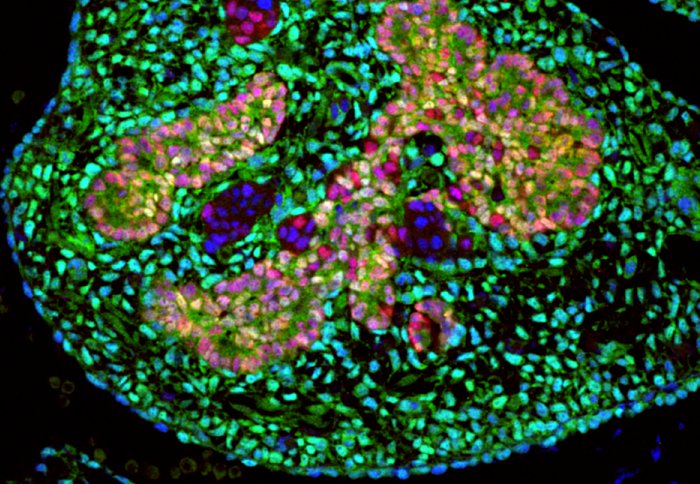Pancreas cells' genetic instructions open doors to diabetes treatment
by Sam Wong

Section of a mouse embryonic pancreas
Scientists have mapped the genetic instructions for pancreas development, providing information that could aid research into diabetes treatments.
Each cell contains instructions for making every cell in the body, but only implements a specific set of instructions that make it turn into a pancreas cell or a brain cell, for example. Cells in the early embryo receive signals that turn on whole networks of genes to determine their fate, but the pathways that regulate this are still largely unknown.
In a study published in Nature Cell Biology, researchers at Imperial College London mapped regions of the genome that are active in early pancreas development. These include not only genes, but also the sequences that don’t encode proteins, called non-coding regions. Until recently most of the non-coding genome was thought of as unimportant.
The results identify a new pathway that regulates pancreas development. The findings will be valuable for efforts to grow pancreas cells in the lab from stem cells. In people with type 1 diabetes, the immune system kills the cells in the pancreas that produce insulin, called beta cells. Growing new beta cells in the lab and transplanting them could be an effective treatment in the future.
Mapping the non-coding regions that regulate pancreas development could also provide insights into pancreatic cancer and other diseases that may arise from errors in the cells’ genetic programme.
Professor Jorge Ferrer, a Wellcome Trust Senior Investigator from the Department of Medicine at Imperial College London, said: “Understanding the instructions that tell cells in the embryo to become pancreas cells should allow us to exploit the genetic programme to grow artificial pancreas cells for transplantation in people with type 1 diabetes.
“Until now, the focus has been on protein-coding parts of the genome, which we call genes. Non-coding portions, which make up 98 per cent of our DNA, have been ignored, but we’re increasingly discovering that they are important for controlling which genes are switched on. We can now map them and derive meaningful insights, which is very exciting.”
The research was supported by the National Institute for Health Research Imperial Biomedical Research Centre.
Reference: I. Cebola et al. ‘TEAD and YAP regulate the enhancer network of human embryonic pancreatic progenitors.’ Nature Cell Biology, 2015 DOI: 10.1038/ncb3160
Article supporters
Article text (excluding photos or graphics) © Imperial College London.
Photos and graphics subject to third party copyright used with permission or © Imperial College London.
Reporter
Sam Wong
School of Professional Development